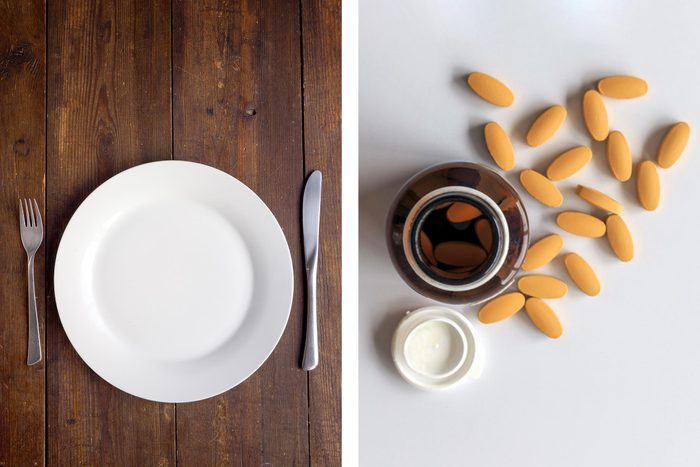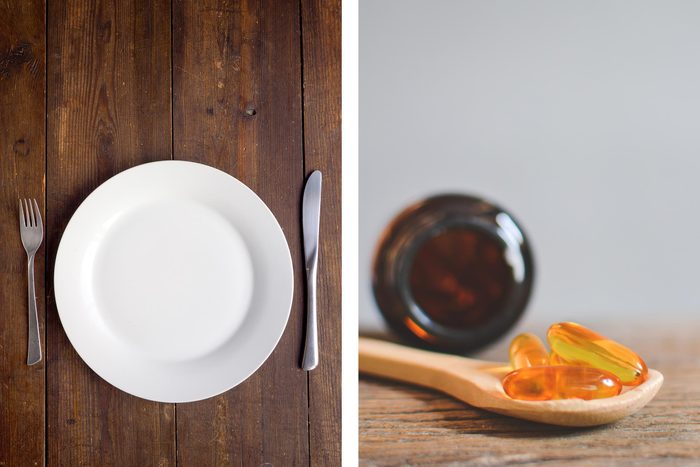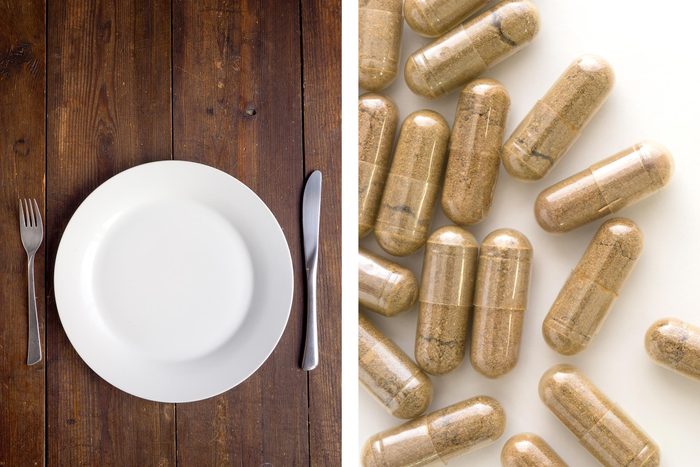The best time to take supplements
Most of the time, eating a healthy diet is enough to provide proper nutrition and you don’t need to take vitamins and dietary supplements. However, they can help in certain cases where the diet may be lacking specific nutrients. As the name suggests, supplements can provide nutritional reinforcement to those with deficiencies or specific populations, such as pregnant women. So, when it comes to taking vitamins and supplements, is the timing important? Well, yes, it can matter.
To get the most bang for your nutritional buck, our health experts explain the best times to take 11 of the most common supplements to enhance their absorption and overall effectiveness.

Iron: With lunch or dinner
It’s typically recommended to take vitamins and supplements with food. Why? Eating gets your digestive juices flowing, says Liz Weinandy, RD, a registered dietitian at The Ohio State University Wexner Medical Center in Columbus, and that will help you break down supplements. “They are also less likely to make you feel nauseous when they are taken with food.” For example, she says, “Iron is best on an empty stomach. but it makes many people nauseous, so they don’t take it,” she explains. “It’s better to take it with food than not at all.” Also, caffeine and milk can interfere with iron absorption, so don’t take it in the morning when you’re drinking tea or coffee, or eating cereal with milk. And taking iron with vitamin C helps improve absorption.

Magnesium: Before bed
Magnesium confers a long list of benefits, from stronger bones and pain relief to heart health and better sleep. “It’s a good idea to take magnesium before bed since it can make you sleepy,” says Weinandy. (Here are 9 magnesium benefits that may help save your life.)

Vitamin C: With a meal at the same time every day
Vitamin C is one of nine water-soluble vitamins; because it’s easy to digest, there’s no better or best time to take your C, Weinandy says. That said, vitamin C is acidic and may cause nausea if consumed on an empty stomach. “Try and take your vitamin C with food at the same time each day so it becomes a habit,” she says. Check out the 11 silent signs of a vitamin C deficiency you’re probably ignoring.

B-complex vitamins: In the a.m.
This is actually an umbrella term for a bunch of B vitamins: Thiamine (vitamin B1), riboflavin (vitamin B2), niacin (vitamin B3), pantothenic acid (vitamin B5), pyridoxine (vitamin B6), biotin, folic acid, and the cobalamin (vitamin B12). “These are best taken in the morning because they can give you energy that you would rather have when the day is first starting.” Learn the 8 secrets vitamin manufacturers don’t want you to know.

Fish oil: Right before a meal
Rich in healthy omega-3 fatty acids, fish oil can lower inflammation and help protect against heart disease. The catch? Fish oil can trigger frequent belching, Weinandy says. The best way to avoid this unpleasant side effect is to keep the supplements in the freezer and take them right before a meal, so they go down first. “When frozen, fish oil supplements go down further in your system [before your body can digest them] and they are less likely to cause belching.” Here are 7 unexpected ways fish oil can benefit your health.

Calcium: Half in the morning, half at night
If you are taking calcium each day to keep your bones strong, says Weinandy, split the dose in two and take half in the morning and the other half in the evening. “High doses tend to spike calcium levels in the blood and are then excreted by the kidneys. This can cause problems in individuals at risk for kidney stones,” Weinandy warns. Women over 50—and men over 71—need 1,200 mg of calcium daily. Younger men and women need 1000 mg per day. Although you can get calcium from foods, including dairy, supplements can close up any gaps. But note that only 500 to 600mg of calcium can be absorbed at a single time. If you’re not a big milk fan, check out these 11 foods with more calcium than a glass of milk.

Prenatal vitamins: Before bed with a small snack
Women who are pregnant need folate (vitamin B9) to help keep their developing baby healthy. Of course, it’s best to get yours from folate-rich foods like asparagus, avocados, and Brussels sprouts, and leafy greens such as spinach and lettuce, but your doctor will likely prescribe a supplement. “Many women report feeling nauseated when pregnant, and prenatal vitamins may make this worse,” Weinandy says. To avoid this: “Take them with a small snack before bed, so if they do make you feel nauseous, you can sleep it off.” Learn more about the vitamins you need to take at every age and stage now.

Vitamin D: With the same meal every day
People who are low in vitamin D may be at higher risk of brittle bones, some types of cancer, obesity, diabetes, and other chronic conditions. D is known as the sunshine vitamin because your body produces it in response to sunlight. If you live at a higher latitude, you may not get enough sun in winter to produce enough of the vitamin—and it’s hard to get the D you need from fortified foods (such as milk). That can mean you may need to supplement. “Vitamin D is a fat-soluble vitamin so you should take it with fat,” Weinandy says. “There is no right or wrong time to take your D, as long as you do it with food. Take it at the same time every day so that it becomes a habit,” she says. “The same advice holds for the other fat-soluble vitamins—A, E, and K.” Are you getting enough D? Check out these 9 signs of vitamin D deficiency.

CBD: Early morning
Cannabidiol—the oil extracted from some types of marijuana—is all the rage these days. People tout benefits like relief from pain and anxiety; unlike tetrahydrocannabinol (THC), CBD won’t make you high. It comes in many forms—rubs, teas, oils, liquids, powders, and pills. CBD is best taken on an empty stomach so time it around periods of not eating, such as first thing in the morning, suggests Los Angeles sleep expert Michael Breus, PhD, author of several books including The Power of When. Learn more about CBD oil here.

Probiotics: With a meal (unless…)
Probiotics are good bacteria that, when present in adequate amounts in the gut, may confer health benefits, says Tsippora Shainhouse, MD, FAAD, a board-certified dermatologist in Beverly Hills and clinical instructor at the University of Southern California. “Some benefits of probiotics are that they may be able to help prevent and even treat some infections and illnesses and promote healthy digestion and perhaps, a healthy immune system,” she explains. There are a dizzying number of types of probiotics available, and the best way to take them will vary, depending on the species. Remember, these are live microorganisms; always follow the instructions on the label for how to store probiotics and when to take them. “Some are best taken with food and some without food,” Weinandy says. “It depends on the probiotic(s) and the way it is encapsulated.” Get your facts straight about probiotics and learn about the best probiotic for women.

Collagen supplements: Not in the a.m.
People often take these supplements in hopes of replenishing their collagen—the springy protein that helps skin retain its elasticity, giving it a youthful, dewy look. “Follow the product label since some forms of collagen have reduced effectiveness when taken with certain beverages such as acidic beverages like orange juice specifically,” Weinandy says. So if you drink acidic beverages in the morning it’s best to take your collagen in the evening. (Check out the 12 foods that can naturally build collagen.)
